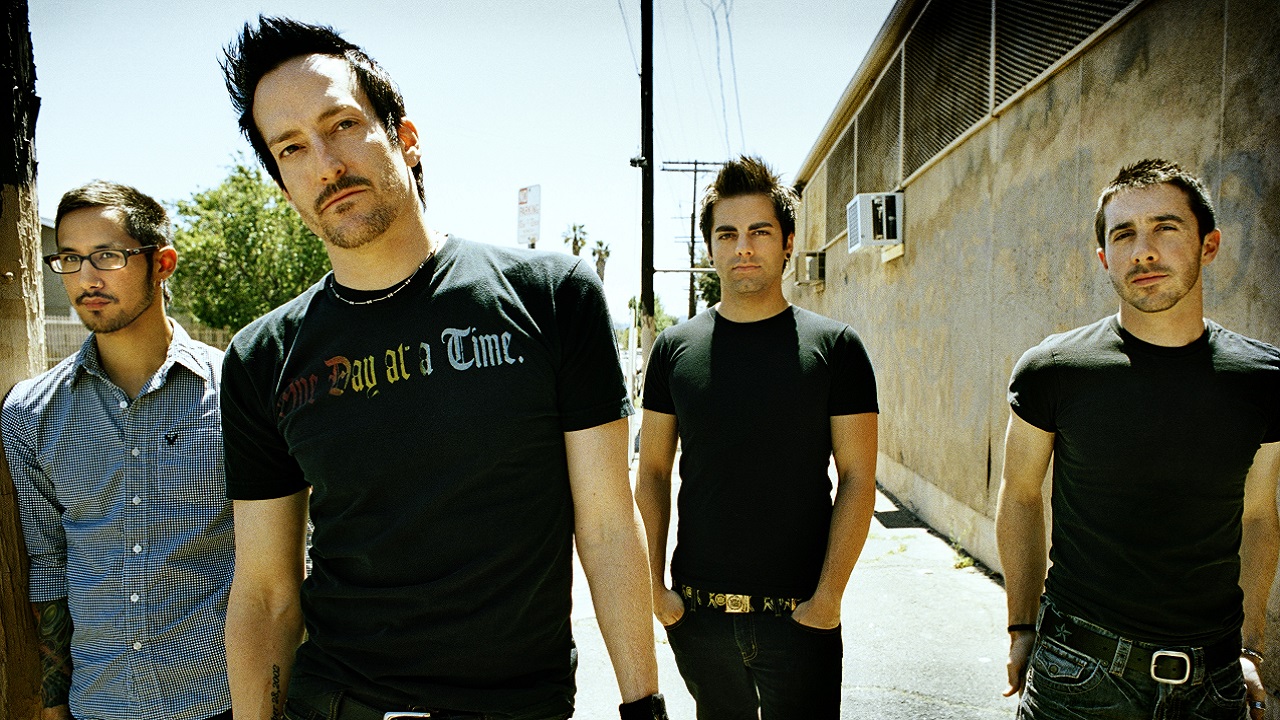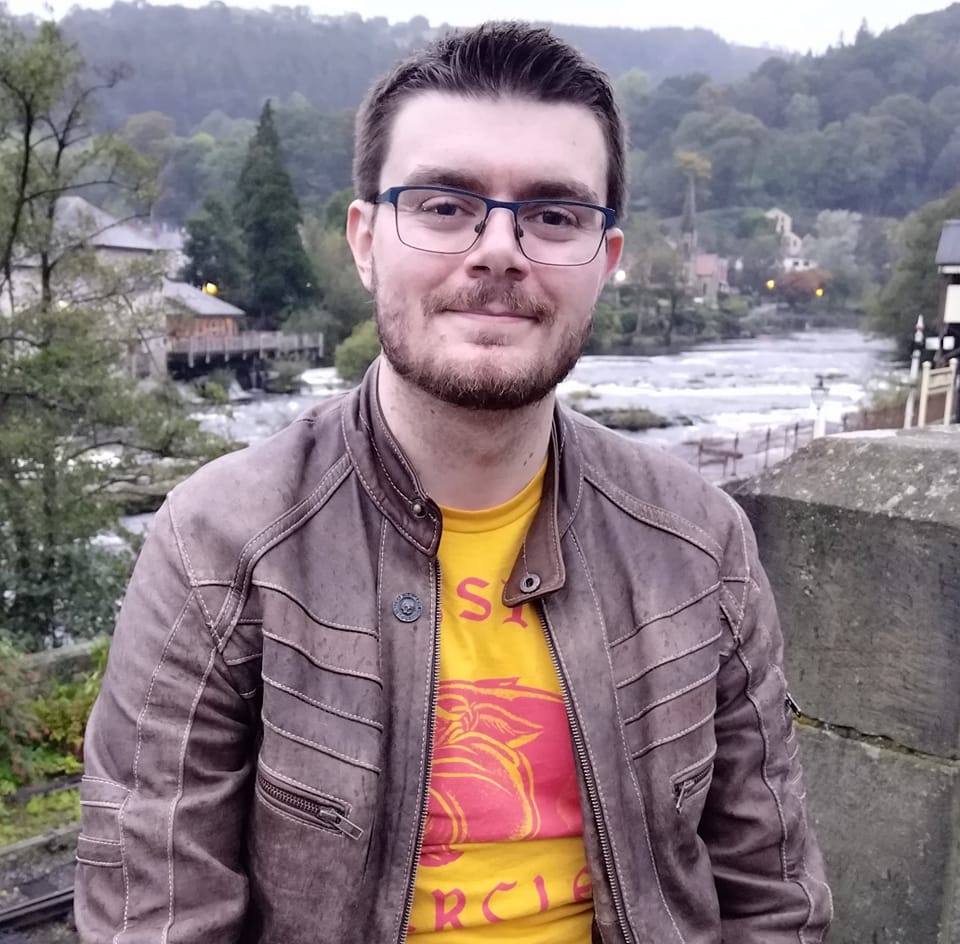From 1981 to 1987, R. Budd Dwyer served as the state treasurer of Pennsylvania. The Republican had been in his post for six years when he was convicted of accepting bribes from a computer company and awarding them a multi-million-dollar government contract. The day before his sentencing, he hosted a press conference where he refused to resign and proclaimed his love for his family… then shot himself, in public and on camera.
Footage of Dwyer’s death was broadcast across Pennsylvania, and recordings of it became a mainstay of the 80s and 90s’ most depraved tapetrading circles. Audio samples showed up in Faith No More and Kreator songs, while Neurosis’s reissue of their debut album, Pain Of Mind, featured a still of his last moment on the cover.
Richard Patrick was 22 years old when he accidentally viewed the clip, and at the time was the guitarist for industrial institution Nine Inch Nails during 1991’s Lollapalooza. “Me and my punk rock friends, we watched this collection of videos from this bookstore that was on Lollapalooza,” the musician recalls. “Lollapalooza had this collection of crazy videos with all kinds of crazy stuff. The kind of things you’d find on YouTube if you looked them up, except there was no YouTube back in the day.”
Talking with Hammer over the phone, it’s clear, more than three decades on, how haunted Richard is by what he saw on tape. “At the very end of this one video, it showed the R. Budd Dwyer suicide,” he continues. “The video footage is insanely graphic and it was horrifying to see.”
As repulsed as Richard remains by that video, the twisted irony is that his post-NIN career took off because of it. Seeing Dwyer’s death inspired the lyrics of Hey Man Nice Shot, the first single by his post-NIN project, Filter. The rumbling bass and chord-powered riffing, together with Richard’s whispers and howls against suicide, gave a scene then addicted to industrial music a fix it craved.
In the process, the band rocketed up the alternative charts, the song becoming a defining statement for his new band. Almost 30 years later, Hey Man Nice Shot remains one of Filter’s most renowned songs. At the time of writing, the track is creeping upon a total of 80 million Spotify streams, surpassed only by Take A Picture from 1999’s Title Of Record.
Hey Man Nice Shot’s mastermind has no false modesty over the fact that he created a hit. When we ask Richard why he thinks his song’s resonated with so many people over so many years, he replies, “Because that guitar part is badass!”
“That chorus guitar part is the coolest drop D guitar part you can write,” he continues. “I can’t remember the guy’s name, but he’s got a big YouTube channel [Rick Beato, with 3.3 million subscribers] and I’m listed as No.10 in his video about the Top 10 drop D guitar parts.”
Despite the pride he now radiates, Richard admits that when he wrote what’s now hailed as a top-shelf metal riff, he “figured no one was going to hear it”. He came up with the music in late 1991 and says that his goal was merely to convince his mates in his hometown of Cleveland that he was cool.
“They were just my punk rock skater friends that would skateboard around town, and we’d get drunk together, have fun, smoke weed and goof off,” Richard recalls. “But they were also critical thinkers, critical of music at the time. They weren’t into hair metal but they really loved Pantera, Ministry, Nirvana and The Smashing Pumpkins. I really appreciated who they admired musically, so I just figured that, if I could impress them, maybe that meant that I could impress more people.”
Richard adds: “The other person in my life that I wanted to impress was Trent Reznor. I wanted my best friend to think, ‘Hey, Rich has got some great talent too!’ I wanted him to be like, ‘Dude, I’m proud of you. You worked hard on this. This is good’ – which is what he said.”
However, before Richard started writing Hey Man Nice Shot, a conversation with Trent caused a massive chip on his shoulder. In September 1991, NIN had just finished what Richard dubs a “disastrous” European tour headlined by Guns N’ Roses. “It was after Lollapalooza: an alternative punk rock kind of festival with underground, alternative kids,” he explains.
“Meanwhile, Guns N’ Roses had a heavy metal audience that weren’t into our, pardon the expression, ‘pussy shit’.” A band lunch in Paris at the end of the tour only furthered Richard’s frustration. The touring guitarist lamented that he was going to move back in with his parents while Trent was about to rent a house in New Orleans so that he could create NIN’s Broken EP. As Richard recalls, Trent unsympathetically responded, “Then get off your ass and write a record.”
“I was shocked,” says Richard. “But at the same time, I was inspired, because, well, you’re goddamn right! You did it [with Pretty Hate Machine]; now it’s my turn.”
Driven to impress his boss and best bud, as well as his punk rock peers back home, Richard immediately holed up in his parents’ beach house in South Carolina and composed Hey Man Nice Shot.
The remainder of what would become Filter’s 1995 debut album, Short Bus, was written between South Carolina, Cleveland and Los Angeles, where the musician travelled to help work on NIN’s second album, The Downward Spiral. Richard formally left the band in 1993, during the making of Downward…, citing a need to express himself; he then co-founded Filter with his former band’s programmer, Brian Liesegang.
Despite (and, ironically, contributing to) Hey Man…’s chart success when it came out as Short Bus’s lead single in April 1995, there was a hurricane of controversy due to the song’s lyrics. Richard envisioned the song as an anti-suicide anthem, murmuring to Dwyer, ‘I wish I would have met you. Now it’s a little late.’
However, the words and sarcastic title were misconstrued as mocking Nirvana’s frontman Kurt Cobain for taking his own life, an act that had broken the hearts of alternative music fans just 12 months earlier. “There was a DJ in Seattle that said, ‘This song is about Kurt Cobain’,” Richard recalls. “But I have the copyrights to prove that it was written in ’91. He was still alive and kicking ass! It was never about Kurt Cobain, and DJs all over the country started insisting that it was.”
“The one thing that I made sure of was that [Nirvana’s] Dave Grohl and Krist Novoselic knew I did not write it about Kurt,” he continues. “I saw Krist at a festival in Seattle and told him, and I saw Dave at an MTV afterparty. Dave said to me that he had heard the song and liked it, but that his friends had told him, ‘It’s about Kurt.’ Fortunately, he’d read a Rolling Stone article we were featured in, where we talked about R. Budd Dwyer. He told me, ‘I believe you.’”
Only a year later, Hey Man Nice Shot entered the mainstream yet again, albeit for a much nicer reason. Director Ben Stiller had comically repurposed it to soundtrack a basketball scene featuring Jim Carrey and Jack Black in The Cable Guy.
“I thought it was hysterical,” Richard remembers. “Ben Stiller’s like a friend of the family, because he and my brother [the T-1000 Terminator himself, Robert Patrick] were friends. It was very cool that they used it, and they paid good money to have it in the movie. They really took care of me, and it was in a great part of a movie I appreciated.”
Hey Man Nice Shot gave Filter’s career a powerful start, propelling Short Bus to No.3 on the Billboard Top Heatseekers chart, with the album achieving platinum status in 1997. In September 2022, Richard brought his career full circle by performing the song with Nine Inch Nails at Riot Fest in Chicago.
Today, he regards it as his quintessential hit, and while summarising his thoughts on it, he brims with pride.
“At every Filter concert, every night, it’s the last song that we play,” he says, “because there’s nothing you could play after it that could top it. It’s like the Rolling Stones playing (I Can’t Get No) Satisfaction or Stone Temple Pilots playing Sex Type Thing. After Hey Man Nice Shot, there’s nothing we can do that’s better than that.”
For mental health support in the UK, contact Samaritans on 116 123. In the US, the suicide & crisis lifeline is 988.

